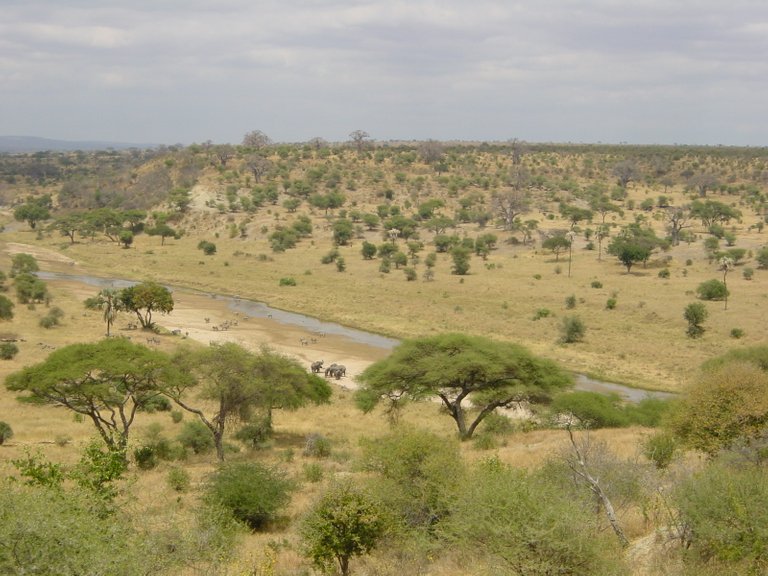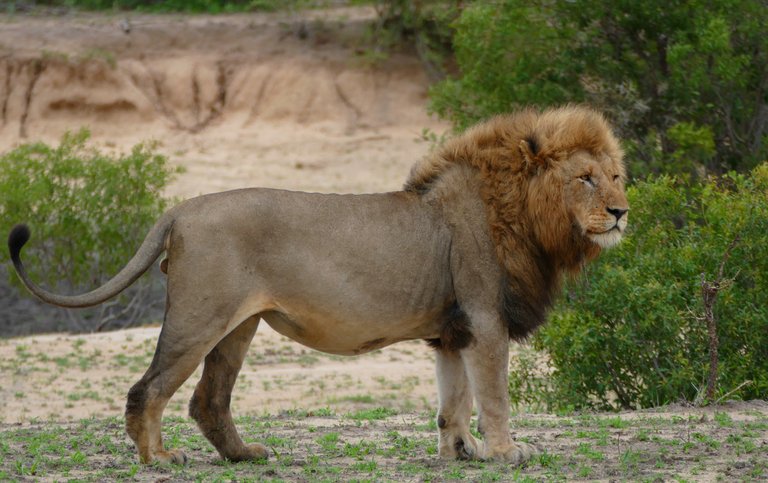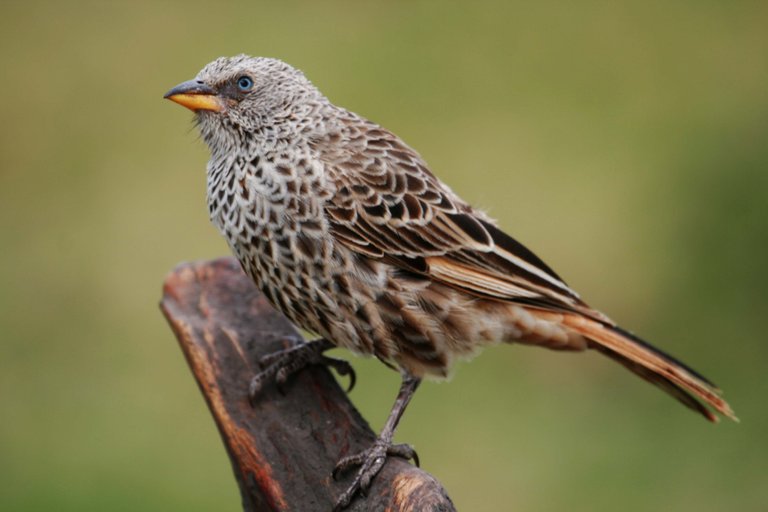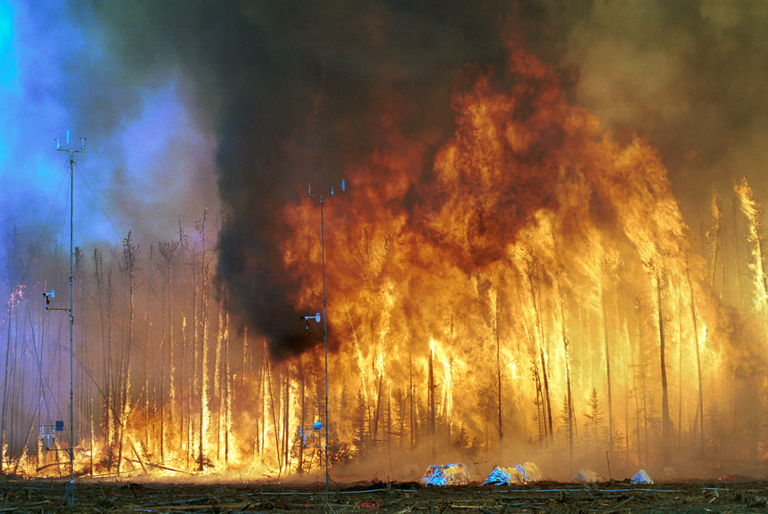The African savannah is a unique ecosystem with many endemic species. A savannah by itself is a grassland with trees in it, but not enough trees that the canopy closes, so there is plenty of light that reaches the ground. Most people believe savannahs to have scattered trees, but the tree density is actually surprisingly high, almost at the level of regular forests.

Tarangire National Park in Tanzania, a good example of the African savannah ecosystem. If you zoom in you will also realize that there is a nice amount of wildlife in the photo! Image is Public Domain.
As you probably know, the savannah is home to lots of well-known and iconic animal species such as lions, hyenas, leopards, warthogs, impalas, gazelles and a lot of other cool species, and a new research paper has a suggested method for increasing the species richness even more; by lighting the savannah on fire.

The king of the savannah! Image by Bernard DUPONT, posted with the Creative Commons Attribution-Share Alike 2.0 Generic license.
Creating wildfire to promote species richness
A brand new research paper from the University of York has looked at how wildfire in the African savannah has affected the species richness in the area, and their conclusion is pretty clear; areas with wildfire have a higher species richness!
The study looked at savannah areas all over Africa, and focused mainly on mammal and bird species richness. Rainy savannah with pyrodiversity boosts had an increase of 27 % mammals and 40 % birds compared to areas that are the same, but without any pyrodiversity.
People commonly think of fires as a static phenomenon, but it is in reality a wide range of different characteristics, such as duration, intensity, size, season and frequency, and the pyrodiversity is a number to explain how much diversity is found within the fires of a given area.
The influence of pyrodiversity correlated with rainfall, and had the best effect in wet savannahs that have more than 650mm rainfall per year. While all savannahs benefits from having fires every once in a while, the wet savannahs were the habitats that got a huge increase in species richness.
Another cool finding of the study was that the rare bids rufous-tailed weaver (Histurgops ruficauda) and black-bellied sunbird (Cinnyris nectarinioides) were more commonly found alongside common birds in areas with a higher pyrodiversity. This is likely because they need a regular fire for their niche, and might be outcompeted by other species if the area develops for too long without any fires.

A rufous-tailed weaver (Histurgops ruficauda), one of the birds who had a positive effect of fires. Image by Profberger at English Wikipedia, posted with the Creative Commons Attribution-Share Alike 3.0 Unported license.
Does it really make sense to induce fires in the savannah?
We all think of forest fires as something terrible, and for the most part this is correct. However, humans and other hominids have set fire to the savannah for a very long time, and according to lead author of the study, Dr Colin Beale from the Department of Biology at the University of York, we have been setting fire to the savannahs for over a million years. This means that the savannah ecosystem has adapted and coevolved in response to this, which is why it might actually be a bad thing that we have stopped doing it.
The research seem to back up this claim, and as a matter of fact, setting the savannah on fire might be a viable conservation strategy that could be used by conservation biologists in the future. Of course we still need a bit more research before we start setting things on fire, but the first results are looking promising.

A forest fire. Note: not Africa, and not a savannah. Image by Bunk S: World on Fire. PLoS Biol 2/2/2004: e54. doi:10.1371/journal.pbio.0020054.g001, posted with the Creative Commons Attribution 2.5 Generic license.
So, why does fire diversity increase species richness?
The reason why the scientists believe that the wildfires increase the species richness is because fires allow for the savannah to create a wider range of conditions for the habitat. The fires will alter the availability of nutrients, change the terrain, change the composition of predator and prey ratio, and change the available food for grazers since plant composition will also change.
Thanks for reading
About @valth
Hey, I'm @valth - the author of this post. I love to write about nature, biology, animals, nature conservation, ecology and other related branches of science, and I occasionally write about my life, about Steem or about random stuff as well. I'm trying my best to write at least one post every day, so make sure to give me a follow if you enjoy my content and want to see more of it.
Join the @valth community!
I love nothing more than to engage with my readers, so please join the @valth community in the comment section. You will definitely find more information about the topic, personal experiences, questions, and even opposing views down there, so don't miss out on learning more.
I always reward users who post good comments, so please take the opportunity to share your views and get a small upvote in exchange for it.
This is a test comment, notify @kryzsec on discord if there are any errors please.
Being A SteemStem Member
Thanks :D
The U.S. government agencies that manage federal lands in similar ecosystems of the U.S. Southwest have found the same thing. The biologists call them "fire-adapted ecosystems."
In the case of the forests especially, they've found that controlled, regular fire not only improves the ecosystem, it prevents damage from hotter fires. They call controlled fires of woodlands and grasslands "prescribed burning."
When fires aren't frequent enough, trees, undergrowth, and fallen material become too plentiful. Then when a fire does occur, it burns so hot that it kills roots, mycelium, and microorganisms in the soil, and burns up the mixed in detritus. What was soil becomes powdered rock, mere dust. Then it takes much longer for the land to recover. And in hilly and mountainous terrain, it leads to dangerous mudslides when it rains.
Thanks for sharing this with us, @vanholio! I'm sort of surprised that I did not come across this information when I researched for this post.
But it really does make sense that smaller fires can have this type of effect. I'm definitely going to have to read up on some fire ecology to learn more about this.
Again, thanks for sharing your knowledge with us!
The history of managing fire is out there on the web. But I got the bit about how the heat if a fire is good or bad from a forest service biologist who's seen it all firsthand. I have yet to read anything that says the same. I'm sure it's in science journals, but that's not for me.
Thanks for the great read! I learned a lot about forest fires in different ecosystems during one of my college ecology classes and was always very fascinated by the idea of fires helping those different ecosystems. I live in Michigan and one of the ecosystems that we have here that is fire dependent would be our Jack Pine Forest up in the north of the Lower Peninsula and in the Upper Peninsula as well. The Jack pine trees rely on fire in order to create sunlit areas which would they would not have access to because the area would normally be dominated by different trees like Oaks. There is a conservation effects that is really fun to monitor when I'm visiting up north in the summer, the Kirkland Warblers have become endangered because they nest and the Jack pine trees and rely on the fires to keep the Jack pines at an age level which is suitable for their nesting. The DNR up there does prescribed burnings to help cycle the Jack Pine Forest and keep the Kirkland Warblers, and lots of other wildlife, able to thrive in that area. When you're up north there's always lots of Smokey the Bear signs that used to say "Only you can prevent forest fires" but all those signs have now been changed to "Only you can prevent wildfires" because forest fires aren't necessarily bad but wildfires are because they're not planned. I also thoigh that was really cool! 😁
Hi, @justfordogz. Thanks for leaving such a good comment here! It's really nice to be able to read about people who have more experience with these things than I have myself, so thanks again for sharing your story with us.
I'm pretty sure the United States are the world leaders when it comes to using forest fires as a conservation tool, but it seems to be a very effective tools when applied correctly.
Controlled burning can definitely benefit wildlife. I live next to Fort Bragg, North Carolina, which has tens of thousands of acres of pine forests. They burn all of it every year, which greatly benefits the entire ecosystem here. It keeps the forests "healthy", and therefore the animals that call it home, especially the red-cockaded woodpecker, which is about to be removed from the endangered list because of the huge benefits to them from controlled burning.
I live in North Carolina, as well. Controlled burns instead of fire suppression has worked wonders on the pine savanna revitalization. I remember several years back large projects initiated to plant long-leafed pines in the Eastern part of the state. Then projects to restore Bobwhite Quails populations to these habitats. These ecosystems had taken a toll with the suppression of fires. It is nice to work with nature and not against it.
Thanks for the great article @valth !
Thanks for sharing your experience with us, @kiristin. It's really great to see that these controlled burn conservation experiments are working out as planned.
Thanks for sharing your local expertise with us, @scottrogers63! I'm not familiar with the burning of the pine forests in North Carolina, so this was interesting to read about :)
@valth
Great article yes fire is definitely part of the “circle of life” now when it happens naturally it is most likely to happen in the place that actually needs it at that moment in time. So if we do man made fires would this have the same benefit or would it be the same as the concept behind crop rotations which if sone wrong actually harms the ecosystem.
I could understand the need to have controlled fires to protect urbanised areas, but in the Savannah would we really need to do that.
As for the African savannahs, the fires have always been man-made, but the rate has been declining in recent times. But I suppose you are correct; we should make it as close to the original fires as possible if we ever want to use this as a conservation tool.
Nature is always optimist like a mother, it finds best out of worst of the worst...Mother nature is indeed so adopting...I would say that mankind should stop testing her limits.
Amazing to see how an ominous thing like fire can have positive effects on the ecosystem...
Yeah, we should probably stop testing the limits before we end up breaking them. At that point we will have a big problem!
Wildfires is actually used in a lot of places in the United States to keep the environment in a natural state, and it's really cool. But I guess it's nice that we are able to control it, because wildfire that goes out of control can really make a mess of burning down entire cities etc.
Yeah windy conditions makes wild fire aggressive and out of control...
Every now and then I hear the news of wild fires getting out of control in Australia and America. ...
Yeah, wildfire that gets out of controls happens every once in a while, and can cause huge amount of damage.
Today i came to know that catching fire have a few pros with all cons. That's why many wild life forest catches fire as in this way nature helps to grow more animals in the forest.
@valth thanks for sharing the other side of picture, which is very beneficial for the growth of wild life. keep sharing :)
Yeah, it's really a vital part of many forest ecosystems.
You're welcome, @kamchore. I'm glad you expanded your knowledge :)
Thank you @valth for another interesting post
Scientists are right that wildfire will increases the species richness
but with the fire others animals will be burn alive and It’s not fair
I think they must do something to prevent the wildfire
What do you think?
I think that wildfire is part of the cycle of nature, and while it's unfortunate that some animals die, it's just part of nature. Nature can be really brutal, and there's nothing we can really do to change that.
Wildlife is a part of nature and we must prevent them because they are living things.every living life is valuable because GOD gave them life .that's we should control burning.
Thanks for sharing valuable info about nature☺☺
I guess we can disagree then; I think controlled fires are really good for the ecosystem as a whole, and we should not stop burning areas based on helping the animals that are currently alive in my opinion. The fires are all part of the cycle of life :)
This is a strange thing for me.. I am reading comments to and wonder what a different experience is this as compared to concept we have.. Whole past years i really feel sorry for animals when i read news of fire in forest.. I remember in my childhood once i wept for animals to see fire in jungle.. However this post invrease my believe in god as he cant do bad for any creature
Yes, this is a bit of a tricky concept. It feels kind of weird how wilfires can have an overall positive impact on the ecosystem, but they really do. They are part of the cycle of life, so there's a good reason for them :)
For keeping of running our ecosystem We have to protect species of the world. We have to protect our forest, then species will save and we will also save. Thank you for awareness.
Yeah, that's true :) Thanks for stopping by!
the species that the wildfire creates are so significant to our system..thanks for this info @valth
No problem! Thanks for stopping by :)
it was a delight to read and go through it all. and a new lesson learned today about savvannah
Thanks, I'm glad you enjoyed it :D
Albeit diminished levels of rivalry after unsettling influence advance species concurrence at little scales, changes in species abundance at bigger scales are controlled by the degree that the neighborhood group is connected to the species pool of the encompassing scene through procedures identified with dispersal, especially mass impacts,
Thank you soo much @valth for this intresting post to share with us,keep sharing.
You're welcome :) I will of course keep sharing!
Thanks for sharing this information. It will inspiring post to us . You don't believe that how much you are useful for us because you are giving us inspirational and motivational post every day. I love the way you are sharing your knowledge with us.
That's why I'm coming on your profile again and again. Keep sharing such news with us. :)
Thank you for the kind words :) I'm glad you like my content!
thanks friend for sharing another great research about the African Savannah
You're welcome :)